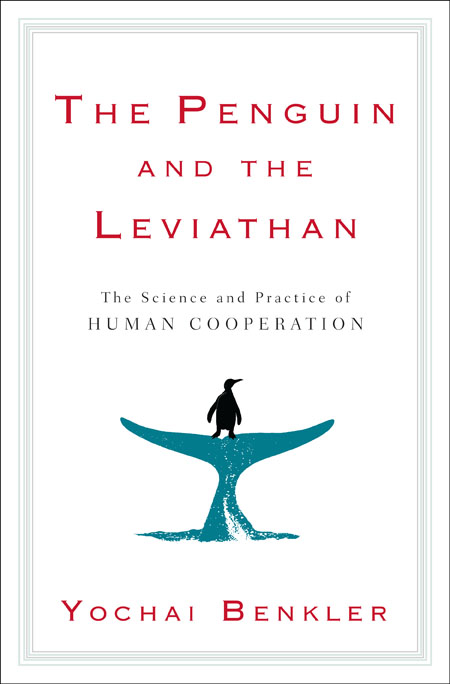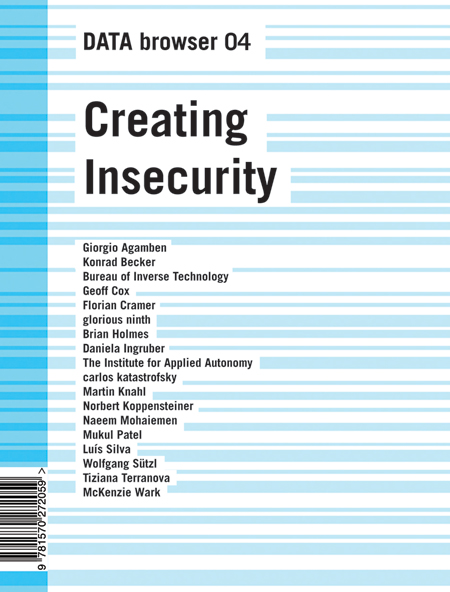Jussi Parikka, Tony D. Sampson (eds.): The Spam Book: On Viruses, Porn, and Other Anomalies from the Dark Side of Digital Culture (2009)
Filed under book | Tags: · internet, media studies, pornography, software, spam, technology, virus

For those of us increasingly reliant on email networks in our everyday social interactions, spam can be a pain; it can annoy; it can deceive; it can overlaod. Yet spam can also enterain and perplex us. This book is an aberation into the dark side of network culture. Instead of regurgitating stories of technological progress or over celebrating creative social media on the internet, it filters contemporary culture through its anomalies.
Contributions by John Johnston, Tony D. Sampson, Luciana Parisi, Roberta Buiani, Jussi Parikka, Steve Goodman, Matthew Fuller & Andrew Goffey, Susanna Paasonen, Katrien Jacobs, Dougal Phillips, Greg Elmer, Richard Rogers, Alexander R. Galloway & Eugene Thacker.
Publisher Hampton Press, 2009
Communication series: Communication alternatives
ISBN 1572739150, 9781572739154
320 pages
review (Gary Genosko, Leonardo)
PDF (updated on 2012-7-15)
Comment (0)Yochai Benkler: The Penguin and the Leviathan: How Cooperation Triumphs Over Self-Interest (2011)
Filed under book | Tags: · biology, business, collaboration, economics, floss, neuroscience, politics, psychology, society, sociology, software, technology, web

What do Wikipedia, Zip Car’s business model, Barack Obama’s presidential campaign, and a small group of lobster fishermen have in common? They all show the power and promise of human cooperation in transforming our businesses, our government, and our society at large. Because today, when the costs of collaborating are lower than ever before, there are no limits to what we can achieve by working together.
For centuries, we as a society have operated according to a very unflattering view of human nature: that, humans are universally and inherently selfish creatures. As a result, our most deeply entrenched social structures – our top-down business models, our punitive legal systems, our market-based approaches to everything from education reform to environmental regulation – have been built on the premise that humans are driven only by self interest, programmed to respond only to the invisible hand of the free markets or the iron fist of a controlling government.
In the last decade, however, this fallacy has finally begun to unravel, as hundreds of studies conducted across dozens of cultures have found that most people will act far more cooperatively than previously believed. Here, Harvard University Professor Yochai Benkler draws on cutting-edge findings from neuroscience, economics, sociology, evolutionary biology, political science, and a wealth of real world examples to debunk this long-held myth and reveal how we can harness the power of human cooperation to improve business processes, design smarter technology, reform our economic systems, maximize volunteer contributions to science, reduce crime, improve the efficacy of civic movements, and more.
For example, he describes how:
• By building on countless voluntary contributions, open-source software communities have developed some of the most important infrastructure on which the World Wide Web runs
• Experiments with pay-as-you-wish pricing in the music industry reveal that fans will voluntarily pay far more for their favorite music than economic models would ever predic
• Many self-regulating communities, from the lobster fishermen of Maine to farmers in Spain, live within self-regulating system for sharing and allocating communal resources
• Despite recent setbacks, Toyota’s collaborative shop-floor, supply chain, and management structure contributed to its meteoric rise above its American counterparts for over a quarter century.
• Police precincts across the nation have managed to reduce crime in tough neighborhoods through collaborative, trust-based, community partnerships.
A must-read for anyone who wants to understand the dynamics of cooperation in 21st century life, The Penguin and the Leviathan not only challenges so many of the ways in which we live and work, it forces us to rethink our entire view of human nature.
Publisher Crown Publishing Group, 2011
ISBN 0307590194, 9780307590190
272 pages
PDF (EPUB)
Comment (0)Wolfgang Sützl, Geoff Cox (eds.): Creating Insecurity: Art and Culture in the Age of Security (2009)
Filed under book | Tags: · art, biopolitics, floss, free software, internet, knowledge, labour, open source, security, software, technology

“Today we are facing extreme and most dangerous developments in the thought of security. In the course of a gradual neutralization of politics and the progressive surrender of traditional tasks of the state, security imposes itself as the basic principle of state activity. What used to be one among several decisive measures of public administration until the first half of the twentieth century, now becomes the sole criterion of political legitimation. The thought of security entails an essential risk. A state which has security as its sole task and source of legitimacy is a fragile organism; it can always be provoked by terrorism to become itself terrorist.
Following the words of Giorgio Agamben (from his 2001 article “On Security and Terror”), security has become the basic principle of international politics after 9/11, and the “sole criterion of political legitimation.” But security — reducing plural, spontaneous and surprising phenomena to a level of calculability — also seems to operate against a political legitimacy based on possibilities of dissent, and stands in clear opposition to artistic creativity. Being uncalculable by nature, art is often incompatible with the demands of security and consequently viewed as a “risk,” leading to the arrest of artists, and a neutralization of innovative environments for the sake of security.
Yet precisely the position of art outside the calculable seems to bring about a new politicization of art, and some speak of art as “politics by other means.” Has art become the last remaining enclave of a critique of violence? Yet how “risky” can art be?”
Contributions from Giorgio Agamben, Konrad Becker, Bureau of Inverse Technology, Geoff Cox, Florian Cramer, glorious ninth, Brian Holmes, carlos katastrofsky, Martin Knahl, Norbert Koppensteiner, Daniela Ingruber, The Institute for Applied Autonomy, Naeem Mohaiemen, Mukul Patel, Luis Silva, Wolfgang Sützl, Tiziana Terranova, and McKenzie Wark.
Publisher Autonomedia/I-DAT, 2009
Creative Commons license
DATA browser series, 4
ISBN 9781570272059
208 pages
PDFs (updated on 2016-12-12)
Comment (0)
